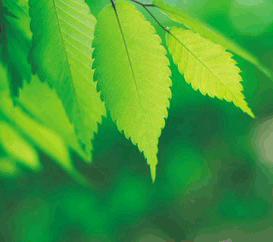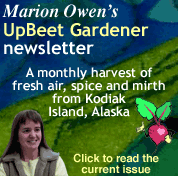
The Smell of Green
When your sense of smell transports you to a different time and place
(First published in the Anchorage Daily News, in Anchorage, Alaska)
Personal essay by Marion Owen
Fearless Weeder for PlanTea, Inc. and
Co-author of Chicken Soup for the Gardener's Soul
FEATURE ARTICLE:

Tom Hanks' "Power of Four" solution
More good stuff:
Who is Marion Owen?
FAQs about PlanTea
Search Marion's articles, tips and recipes
Why grow organic?
News and press releases
Read love letters
How to link to this site
Need a speaker?
How to contact Marion
Visiting Alaska?
Come to Kodiak Island!
Go to home page

Marion's UpBeet Gardener
Newsletter has been
replaced by Marion's blog
which you can find at:
www.marionowen.wordpress.com
 Standing at the rail of our boat, Chris threw his head back, closed his eyes, and inhaled deeply.
Standing at the rail of our boat, Chris threw his head back, closed his eyes, and inhaled deeply.
"I finally have my nose back!" the East Coaster declared. On vacation in Kodiak, he was on a dinner cruise with us, which meant three and a half hours to sniff his fill of salt air, salmon Kiev and other rich smells from the galley and the sea. Later, back in the harbor, he smiled again at the new scents there. "I can smell the trees--so nice," he said.
I know what it's like to lose your nose and then find it again. I had a life-changing experience in the early '80s while working aboard the University of Washington's research ship, the Thomas G. Thompson. We were steaming back from Guam, headed for the barn: Seattle. We'd been at sea for three weeks, away from any sight of land.
Wall-to-wall ocean, especially in the warm tropics, does something to your senses. The water is so salty, so saline, that at 'swim calls', where the ship stops so the crew and scientists can take a dip, you float higher in the water, as if pushed up by a magic hand. On board, whenever you lick your lips, you taste salt. Inhale through your mouth and you taste salt. You can't get away from it, except, perhaps, when taking a shower.
Because of the high salinity, salt crystals form on the decks and railings--even your skin-- like granules of sugar. With the acrid smell of ocean water and sweat, always sweat, mixed with suntan lotion and more salt air, your nose is dulled with monotony. The occasional tropical rain squall sends the crew out on deck, arms outstretched, faces turned upwards in relief. The fresh rain washes away the taste and smell of the ever-present salt, even if for just a short while.
It had been a long, hot, salty journey. I went to the pilot house to stand my 4-hour watch as an offshore breeze dimpled the low ocean swell. I glanced at the chart. One hundred miles to go before we entered Cape Flattery, the funnel-shaped entrance to the Straits of Juan de Fuca at the northwest corner of Washington State. It was downhill from there: East through the straits and then south, down Puget Sound and into the locks at Shilshole Bay.
Eight bells sounded, and my watch was over. I went below to the main deck and joined several crew mates, also restless and anxious to be home. Leaning against the metal railing like race horses at the starting gate, we peered at the horizon, straining to see land. We'd been away from homeport nearly three months and we were tired of shipboard life.
I smelled it hours before I saw it. Green. Chlorophyll. Leaves. Land. The round smell was sweet and full. Tears streamed down my cheeks. At first, I didn't believe my nose. Was this for real?
The smell of land triggered more than tears of joy. It told me that it was time to take a new road in life; to find a new job. Within a year I'd moved to Kodiak Island and followed a compelling urge to learn everything I could about gardening.
Scientists say you can recall smells more accurately than visual cues, like faces and photographs. Our odor memories often have strong emotional qualities that are tied with good or bad experiences. What's more, olfaction--our sense of smell--is handled by the same part of the brain that handles memories and emotions. That explains why we can immediately recognize and respond to smells from childhood like the smell of cookies baking in the oven, the smell of new books or clean sheets.
On a warm, dew-kissed morning last week, I stepped outside the house, coffee cup in hand, to greet the day. My nose caught the smell of budding cottonwood leaves. I was instantly launched back in time to that evening aboard ship, leaning on the railing, steaming toward the coast.
I smiled a present-moment smile, glad for the decision I'd made, based on the smell of green.
![]()
Thanks for visiting and please stop by again. I'll put the coffee on!
Meet Marion Owen /// Learn about PlanTea /// Online Catalog /// Articles, Tips, Recipes /// Get free UpBeet Gardener newsletter /// Read current issue /// Listen to radio show /// Read news and press releases /// More resources and links /// Learn why 'grow organic?' /// View guidelines for retailers /// Read love letters /// Book Marion as a speaker /// Site map /// How to link to us /// Contact us /// Go to home page
PlanTea: The organic plant food in tea bags. http://www.plantea.com
Copyright ©1996 to present: PlanTea, Inc. All Rights Reserved. PO Box 1980, Kodiak, AK 99615-1980 USA
Questions or comments? marion@plantea.com Phone: Toll Free: 1-800-253-6331 (US and Canada); 907-486-2500
